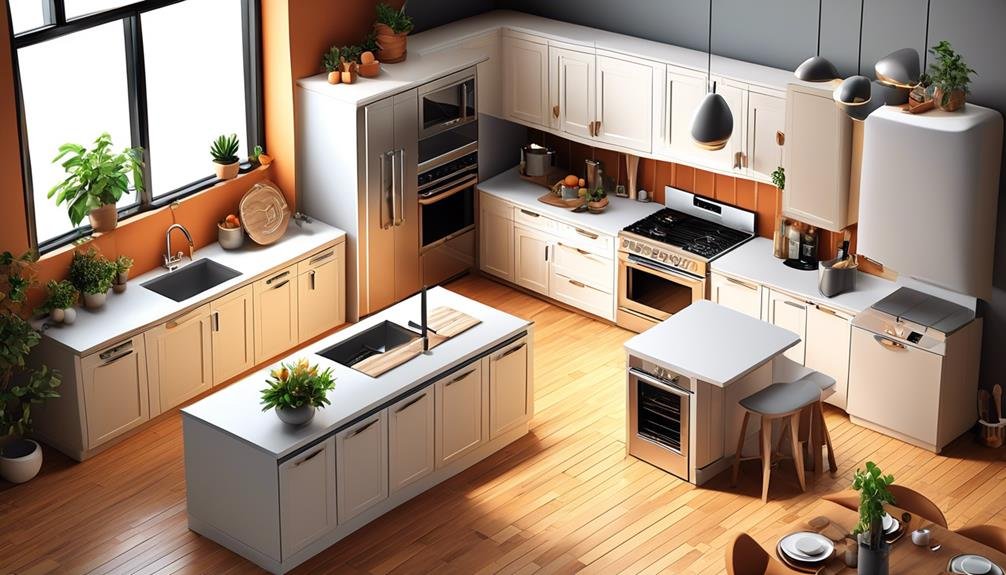You know what they say: 'A penny saved is a penny earned.' And when it comes to lowering your utility bills through conservation, every penny counts.
But where do you start? How can you make a meaningful impact without sacrificing your comfort?
Well, my friend, in this discussion, we'll explore a range of tips and tricks that can help you achieve just that. From adjusting thermostat settings to conducting regular home energy audits, we'll uncover practical ways to not only reduce your utility bills but also contribute to a more sustainable future.
So, without further ado, let's dive into the world of energy conservation and discover how you can save money while making a difference.
Key Takeaways
- Adjust thermostat settings to lower temperature when away or sleeping, and use a programmable thermostat for automatic adjustments. This can lead to a reduction in heating costs.
- Insulate your home by insulating the attic, walls, windows, doors, and basement or crawl space. Proper insulation helps keep warm air inside during winter and cool air inside during summer.
- Upgrade to energy-efficient appliances with the ENERGY STAR label to save on electricity or gas usage. Consider the size and features of the appliance to meet your specific needs.
- Unplug unused electronics to reduce electricity consumption, extend lifespan, reduce wear and tear, and contribute to sustainability. Many electronics draw power even when not in use, so unplugging them can lead to savings and lower your carbon footprint.
Adjusting Thermostat Settings
To lower your utility bills, consider adjusting your thermostat settings. The temperature you set your thermostat to can greatly impact your energy usage and, consequently, your bills. During the winter months, try setting your thermostat to a lower temperature when you're away from home or sleeping. A decrease of just 1 degree Celsius can result in a 1% reduction in your heating costs.
Additionally, consider investing in a programmable thermostat, which allows you to automatically adjust the temperature based on your schedule. During the summer, set your thermostat to a higher temperature when you're away from home or at night. This can help reduce your cooling costs.
Dressing appropriately for the weather, such as wearing warmer clothing in the winter and lighter clothing in the summer, can also help you maintain a comfortable temperature while using less energy.
Insulating Your Home
Insulating your home is a practical and effective way to reduce energy loss and lower your utility bills. Proper insulation helps to keep the warm air inside during the winter and the cool air inside during the summer. This can significantly reduce the amount of energy needed to heat or cool your home, ultimately saving you money.
One of the first areas to consider insulating is the attic. Since heat rises, a poorly insulated attic can result in a substantial amount of heat loss. Adding insulation to your attic can help prevent this and keep your home more comfortable year-round.
Another important area to insulate is your walls. Insulating the walls can help reduce heat transfer between the inside and outside of your home. This can be done by installing insulation in the wall cavities or by adding insulation to the exterior walls.
Don't forget about the windows and doors. These areas can be significant sources of heat loss. Installing weatherstripping or caulking around windows and doors can help seal any gaps and prevent drafts.
Lastly, insulating your basement or crawl space can also make a difference in energy efficiency. By insulating the floors above these spaces, you can prevent heat loss and keep your home warmer.
Upgrading to Energy-Efficient Appliances

Consider upgrading to energy-efficient appliances to further reduce your energy consumption and save on utility bills. Energy-efficient appliances are designed to use less electricity or gas while still performing at the same level as their less efficient counterparts. By investing in these appliances, you can not only reduce your carbon footprint but also enjoy long-term savings on your utility bills.
Here is a table showcasing the potential savings you can achieve by upgrading to energy-efficient appliances:
| Appliance | Annual Energy Savings | Annual Cost Savings |
|---|---|---|
| Refrigerator | $100 | $80 |
| Washing Machine | $50 | $40 |
| Dishwasher | $30 | $25 |
As you can see, upgrading to energy-efficient appliances can lead to significant savings. For example, replacing an old refrigerator with an energy-efficient one can save you around $100 per year, while a new washing machine can save you approximately $50 annually. These savings can quickly add up over time.
When shopping for energy-efficient appliances, look for the ENERGY STAR label. This certification ensures that the appliance meets strict energy efficiency standards set by the government. Additionally, consider the size and features of the appliance to ensure it meets your specific needs.
Investing in energy-efficient appliances is a practical and effective way to lower your utility bills while reducing your environmental impact. Make the switch today and start enjoying the benefits of energy efficiency.
Unplug Unused Electronics
When trying to lower your utility bills, one effective way is to unplug unused electronics. This simple act can have a significant impact on your energy consumption and ultimately, your monthly bills.
Here are some reasons why you should make it a habit to unplug unused electronics:
- Energy vampires: Many electronics, such as televisions, computer monitors, and phone chargers, continue to draw power even when they aren't in use. These energy vampires can account for a significant portion of your energy bill.
- Standby power: Electronics in standby mode, like game consoles and cable boxes, consume electricity even when they aren't actively being used. Unplugging them when not in use can help reduce unnecessary energy consumption.
- Fire hazard: Leaving electronics plugged in increases the risk of electrical fires, especially if they're left unattended for long periods. Unplugging them minimizes this risk and ensures the safety of your home.
- Extend lifespan: Continuously keeping electronics plugged in can lead to wear and tear over time. Unplugging them when not in use can help extend their lifespan and save you money on repairs or replacements.
- Environmental impact: By unplugging unused electronics, you're reducing your carbon footprint and contributing to a more sustainable environment.
Unplugging electronics may seem like a small step, but it can make a big difference in both your utility bills and environmental impact. Make it a habit to unplug unused electronics, and watch your energy consumption and expenses decrease.
Using Natural Light Instead of Artificial Lighting

To further reduce your utility bills and conserve energy, harness the power of natural light instead of relying on artificial lighting. Using natural light not only helps you save money but also has numerous benefits for your health and well-being. Here are some practical tips to make the most of natural light in your home.
First, keep your windows clean to allow maximum sunlight to enter. Dust and dirt on windows can reduce the amount of light that comes through, so make sure to clean them regularly.
Next, consider the placement of furniture and objects in your home. Avoid blocking windows and obstructing the flow of natural light. Arrange your furniture in a way that allows light to reach all areas of the room.
You can also use light-colored or reflective surfaces to maximize natural light. Light-colored walls, ceilings, and floors help to bounce light around the room, making it feel brighter and more spacious.
Additionally, using sheer curtains or blinds can help control the amount of light entering your home. They allow natural light to filter through while still providing privacy and reducing glare.
Lastly, consider installing skylights or light tubes in areas that lack natural light, such as hallways or bathrooms. These can bring in additional sunlight and reduce the need for artificial lighting during the day.
Taking Advantage of Off-Peak Hours
Lower your utility bills and save energy by taking advantage of off-peak hours. Off-peak hours are the times of day when there's less demand for electricity, typically during late evenings, early mornings, and weekends. By shifting your energy usage to these times, you can enjoy lower electricity rates and contribute to a more sustainable energy grid.
Here are five ways to make the most of off-peak hours:
- Run your dishwasher, washing machine, and dryer during off-peak hours. These appliances use a significant amount of energy, so using them when electricity demand is lower can help you save money.
- Charge your electronic devices overnight or during off-peak hours. This won't only save you money but also extend the lifespan of your devices' batteries.
- Set your thermostat to adjust during off-peak hours. Lowering the temperature in the winter and raising it in the summer during these times can help you save on heating and cooling costs.
- Use your oven, stove, and other energy-intensive appliances during off-peak hours. This will help you avoid higher rates during peak times when electricity demand is higher.
- Consider using a programmable timer or a smart home device to automate your energy usage during off-peak hours. This way, you can take advantage of lower rates without having to manually adjust your appliances.
Taking advantage of off-peak hours is a simple and effective way to reduce your utility bills and conserve energy. By making a few small changes to your daily routine, you can make a big difference in both your wallet and the environment.
Conserving Water Usage

By being mindful of your water usage, you can further reduce your utility bills and contribute to a more sustainable lifestyle. Conserving water is not only beneficial for your wallet but also for the environment. Here are some practical tips to help you save water and lower your utility bills:
| Tips for Conserving Water Usage |
|---|
| Fix any leaks promptly. |
| Install water-efficient fixtures and appliances. |
| Take shorter showers. |
| Only run the dishwasher and washing machine when you have a full load. |
Fixing leaks promptly is crucial as even a small leak can waste a significant amount of water over time. Installing water-efficient fixtures and appliances, such as low-flow showerheads and toilets, can help reduce water usage without sacrificing performance.
Shortening your showers can also make a big difference. By cutting just a few minutes off your shower time, you can save gallons of water each day. Additionally, only running your dishwasher or washing machine when they are full can help you save both water and energy.
Conducting Regular Home Energy Audits
Regularly conducting home energy audits can help you identify areas where you can improve energy efficiency and reduce your utility bills. By assessing your energy usage, you can make informed decisions about where to focus your conservation efforts.
Here are some reasons why home energy audits are beneficial:
- Identify energy-wasting areas: An audit allows you to pinpoint specific areas in your home where energy is being wasted, such as drafty windows or inefficient appliances.
- Prioritize energy-saving upgrades: With the information gathered from an audit, you can determine which upgrades will have the most significant impact on reducing your energy consumption and prioritize them accordingly.
- Increase comfort: By addressing energy inefficiencies, you can improve the overall comfort of your home. You can eliminate drafts, regulate temperature better, and ensure consistent heating and cooling.
- Save money: A home energy audit can help you uncover costly energy leaks and provide you with a roadmap to make cost-effective improvements, resulting in lower utility bills.
- Contribute to sustainability: By reducing your energy consumption, you're actively contributing to a more sustainable environment and reducing your carbon footprint.
Regularly conducting home energy audits is a practical and effective way to identify and address energy inefficiencies in your home, leading to reduced utility bills and a more sustainable lifestyle.
Frequently Asked Questions
How Can I Reduce My Utility Bills Without Adjusting Thermostat Settings?
You can reduce utility bills without adjusting thermostat settings by unplugging electronics when not in use, using energy-efficient light bulbs, sealing air leaks, and using natural light instead of artificial lighting.
Are There Any Other Ways to Insulate My Home Besides the Ones Mentioned in the Article?
There are other ways to insulate your home besides those mentioned in the article. You can seal air leaks around windows and doors, use weatherstripping, and add insulation to your attic and walls.
What Are Some Other Ways to Lower Utility Bills Without Upgrading to Energy-Efficient Appliances?
To lower utility bills without upgrading appliances, you can try adjusting your thermostat, using natural light, unplugging electronics when not in use, and using energy-efficient light bulbs. These simple actions can make a big difference.
How Can I Save Energy by Using Natural Light if My Home Doesn't Have Many Windows?
If your home lacks windows, you can still save energy by using natural light. Consider installing skylights or solar tubes to bring in more sunlight, and use light-colored paint and mirrors to reflect and distribute light.
What Are Some Alternative Ways to Conserve Water Usage That Aren't Mentioned in the Article?
To conserve water usage, try installing low-flow showerheads and faucets, fixing leaks promptly, and using a dishwasher and washing machine with full loads. These simple changes can make a big difference in your water bill.
Conclusion
In conclusion, by implementing simple conservation practices, you can significantly lower your utility bills. Adjusting thermostat settings, insulating your home, upgrading to energy-efficient appliances, and unplugging unused electronics are effective ways to reduce energy consumption.
Using natural light, taking advantage of off-peak hours, conserving water usage, and conducting regular home energy audits can also make a big difference.
By incorporating these tips into your daily routine, you can save money while also helping the environment.





